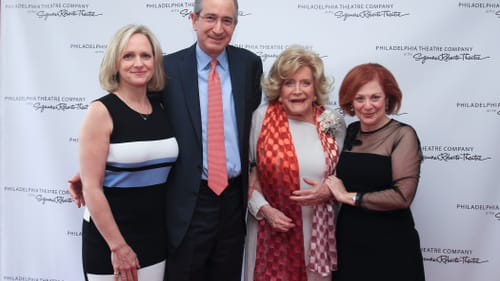Stay in the Loop
BSR publishes on a weekly schedule, with an email newsletter every Wednesday and Thursday morning. There’s no paywall, and subscribing is always free.
Coming down the mountain
Will Paige Price make or break Philadelphia Theatre Company?

When Paige Price came to the aid of the Philadelphia Theatre Company (PTC) as its new producing artistic director and suddenly shut down its 2017-2018 season with no new self-produced plays, many otherwise cool local-theater heads exploded. Mine did, too.
With Sara Garonzik leading the company since 1982, PTC has been a force, not only in Philadelphia but throughout the East Coast, for opening and/or premiering adventurous theater events from Terrence McNally, Daniel Stern, Alan Zweibel, David Ives, Bill Irwin, and others. By 2007 the company had centered itself in the plush new Suzanne Roberts Theatre. Famously designed by Kieran Timberlake with 365 seats and a tall glass lobby, the placing of PTC on the Avenue of the Arts was supposed to ring loudly the bell of artistic and financial prosperity, especially with a local-theater scene then on the fiduciary upswing. This wasn’t supposed to mean, by 2015, a nearly $1 million debt and a nearly $2 million loan to buy back the theater after losing it in foreclosure.
With Garoznik leaving, New Jersey-born Price, a dancer/singer/actor turned Theatre Aspen executive artistic director and a chief at Actors Equity, offered the promise of a bustling new theater season. Price had famously pulled the glamorous but small Theatre Aspen out of the deep red and into the black, and invigorated the financial aid of a supportive community. But there was to be no new PTC season.
With Price declining to hit the ground running, my initial opinion was harsh. If other locals could make a season, why couldn’t she? When PTC announced it would outsource shows from out-of-towners and rent the theater for concerts and comedy shows, it seemed the company had failed itself.
Sink, swim, or tread water?
But had it? In an interview, Price asserted that this is a temporary reset “other local theater operators said in quiet they wish they had the opportunity to do.” She continued, “I was excited to come to Philadelphia because it was a city with an artistic community I heard much about. I wasn’t scared off by the challenges. The biggest question I had going into this was about the culture of philanthropy.”

During Price’s time with Theatre Aspen, she pulled that organization out of debt with both the support of art patrons in the area and by keeping fundraising goals and the work that followed small, mobile, intelligent, and reasonable. “In Aspen,” she said, “there are people with enthusiasm for supporting the arts — mostly individuals, as there is no corporate or foundation support at all.” Price made that theater scene a vibrant, fun, and entertaining family culture where locals pulled for the little company that could. “We didn’t aim higher than we knew we could support and went about an ambitious but achievable strategic plan.”
To Price, Philly’s golden path seemed very similar to that of Aspen, though there was still the question of a big house whose company can’t quite afford it, a problem addressed, ironically, from PTC’s new stage by monologist Mike Daisey’s How Theater Failed America, during 2009’s Philly Fringe Festival. (Price says Daisey is slated to return to PTC next season.) “PTC has a stunning theater that deserves a chance to thrive,” she said. “Timing seems to have played a very crucial and unfortunate role in PTC’s difficult road. I believe taking this year to reorganize will help us find the best way to operate so we can sustain the work we want to produce.”
Price described the break as a nuts-and-bolts choice. “With the one opportunity a new leader gets to make changes, it seemed we were going into a season that was going to stretch it financially.” Garoznik did indeed have a new season planned, but two weeks before Price started, interim managing director Amy Kaissar suggested trying out the radical idea.
Kaissar said, “It was a hard decision, but when I started putting numbers to the 2017-18 season plans, we realized there was going to be a significant deficit. There are only two ways to solve that — more income or fewer expenses.” Price turned the concept of taking a year to fix the underlying issues into a plan that will ultimately give PTC’s patrons more options to choose from this year (“and not less,” Kaissar added, “as we keep the building full of exciting and engaging presentations, whether PTC is the producer, presenter, or lessor”).

“Look,” Price said, “I knew it would take more time to thoughtfully see how we fit into the scene before I could program confidently.” Not only would Price have to survey audiences, talk more with donors and other theater operators and actors (neighbors from the Drake and the Wilma have been particularly friendly and informative), she would also need to see much more theater in this town. “I’m highly caffeinated these days,” she added with a laugh.
Staging the "gap year"
Ask Price what impression she thinks her bold move sends to a very active theater scene and she says the “gap year” is a weird plus. “Running a theater is intense. You are always ‘behind’ and the space to think strategically gets hard to carve out. So, I’ve had nothing but positive reinforcement.”
In the meantime, PTC’s programming for its next season falls into two categories: theatrical events curated and presented by PTC from other companies and noncurated rental events. Kaissar says that “all will open up the theater to a broader group of artists and audiences.”
Price says the biggest risk for her and PTC is keeping their subscribers confident “that we’ll definitely be back in a year, that we have plans in place, to include them in the upcoming season in an unusually engaged way, for those that are up for it.”
As an actor/director, Price understands the value of achieving and maintaining creative heights. As the creative showrunner of both Aspen Theatre and Actors Equity, she also knows the value of a buck. I believe her when she says other local producers and directors would love a season off to regroup; the insistent need to satisfy aesthetic highs and bottom lines must be taxing.
So give Price her season to remake/remodel — and bug me in 2018 to see how I feel.
Sign up for our newsletter
All of the week's new articles, all in one place. Sign up for the free weekly BSR newsletters, and don't miss a conversation.

 A.D. Amorosi
A.D. Amorosi